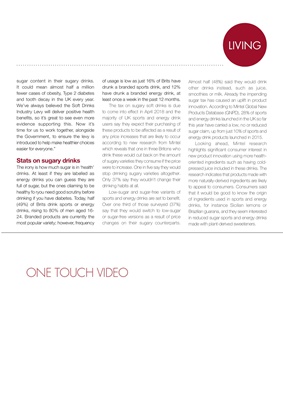
KITLIVING
sugar content in their sugary drinks.
It could mean almost half a million
fewer cases of obesity, Type 2 diabetes
and tooth decay in the UK every year.
We've always believed the Soft Drinks
Industry Levy will deliver positive health
benefits, so it's great to see even more
evidence supporting this. Now it's
time for us to work together, alongside
the Government, to ensure the levy is
introduced to help make healthier choices
easier for everyone."
Stats on sugary drinks
The irony is how much sugar is in 'health'
drinks. At least if they are labelled as
energy drinks you can guess they are
full of sugar, but the ones cliaming to be
healthy fo ryou need good scrutiny before
drinking if you have diabetes. Today, half
(49%) of Brits drink sports or energy
drinks, rising to 80% of men aged 16-
24. Branded products are currently the
most popular variety; however, frequency
of usage is low as just 16% of Brits have
drunk a branded sports drink, and 12%
have drunk a branded energy drink, at
least once a week in the past 12 months.
The tax on sugary soft drinks is due
to come into effect in April 2018 and the
majority of UK sports and energy drink
users say they expect their purchasing of
these products to be affected as a result of
any price increases that are likely to occur
according to new research from Mintel
which reveals that one in three Britons who
drink these would cut back on the amount
of sugary varieties they consume if the price
were to increase. One in five say they would
stop drinking sugary varieties altogether.
Only 37% say they wouldn't change their
drinking habits at all.
Low-sugar and sugar-free variants of
sports and energy drinks are set to benefit.
Over one third of those surveyed (37%)
say that they would switch to low-sugar
or sugar-free versions as a result of price
changes on their sugary counterparts.
Almost half (48%) said they would drink
other drinks instead, such as juice,
smoothies or milk. Already the impending
sugar tax has caused an uplift in product
innovation. According to Mintel Global New
Products Database (GNPD), 28% of sports
and energy drinks launched in the UK so far
this year have carried a low, no or reduced
sugar claim, up from just 10% of sports and
energy drink products launched in 2015.
Looking ahead, Mintel research
highlights significant consumer interest in
new product innovation using more healthoriented
ingredients such as having coldpressed
juice included in these drinks. The
research indicates that products made with
more naturally-derived ingredients are likely
to appeal to consumers. Consumers said
that it would be good to know the origin
of ingredients used in sports and energy
drinks, for instance Sicilian lemons or
Brazilian guarana, and they seem interested
in reduced sugar sports and energy drinks
made with plant-derived sweeteners.
ONE TOUCH VIDEO